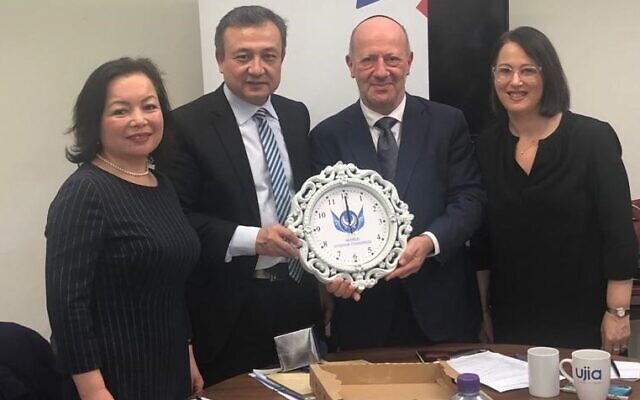Meet the Uyghur campaigner who’s a regular at Shabbat dinners

Jewish News, 17 April 2020

Below is an article published by Jewish News.
Jonathan Shamir -For Rahima Mahmut, the plight of the Uyghur Muslim minority in China is more than religious or ideological – it is personal.
A human rights campaigner whose family members are among the hundreds of thousands with an unknown fate in Xinjiang Province, Rahima is a long way from home, but says she has found a home from home with the Jewish community, so much so that she is now a regular at Shabbat dinners.
Speaking to Jewish News last week, she said the experience had been “heart-warming, peaceful, and spiritual,” as she reflected on the support of a community whose people were once also persecuted and detained en masse.
She has not been home in 20 years and since the height of the Chinese government’s crackdown in 2017 she has lost contact with her family, including her nine siblings.
“Being in a warm family environment brings back a lot of beautiful memories,” she says, adding that the Jewish response to the plight of Uyghur Muslims in Western China had made her “very happy” and “given us hope”.
The issue previously inspired only a narrow coalition of Chinese democrats and Tibetan activists, but having the Jewish community behind them “gives us a lot of strength,” she says.
At a Board of Deputies roundtable meeting in January, Dolkun Isa, president of the London-based World Uyghur Congress (WUC), said: “In this time of grave crisis, it is essential to build a stronger cooperation between different groups. Uyghurs need global support from all human beings.”
The Uyghur community in London numbers only 500, and the WUC is only six months old, but Rahima has already begun reaching out as its project director, despite serious fears among the Uyghur community about political activity.
“If you pick up phone calls from foreign countries, you can get in huge trouble,” she says, adding that one of her close friends, based in Germany, discovered this the hard way when her sister, a PhD student in Malaysia, went missing in 2018, while her sister-in-law was jailed for 19 years for talking to her husband in Germany.
The Uyghurs’ relationship with the Jewish community began when Rahima was approached by a Jewish barrister, Amy Woolfson, who suggested a meeting with René Cassin, the Jewish human rights organisation based in London.
René Cassin hosted the first event in May last year, swiftly followed by a joint iftar consisting of Uyghurs and Jews, held in solidarity with Chinese Muslims prevented from observing Ramadan.
Evidence of the Uyghurs’ plight has been submitted to the UK’s Foreign Affairs Select Committee inquiry and he British Jewish community has since stepped up its response to through a series of campaigns and actions.
Much of this has been led by the Board of Deputies with interfaith and social action officer Anthony Silkoff telling Jewish News that the Board “felt that it was important for us to make our voice heard, as the representative body for the Jewish community, after learning about the terrible situation”.
He said: “Because of our history, and in particular the context of the Holocaust, many Jews feel that it is the responsibility of all of us in our community to stand up against persecution.”
After the roundtable discussion in January, the Board followed up with an event at Portcullis House in Parliament outlining what actions can be taken to support the Uyghur community, while Board vice-president Edwin Shuker wrote to the Government’s Special Envoy for Freedom of Religion or Belief, Rehman Chishti MP.
Next week René Cassin, the European Union of Jewish Students (EUJS), and the Union of Jewish Students (UJS) were due to host a ‘Day of Awareness,’ including a demonstration outside the Chinese Embassy’s Cultural Division, but this has now been postponed due to coronavirus fears.
René Cassin director Mia Hasenson-Gross said described “the close relationship” between the Jewish and Uyghur communities, while Rahima described Hasenson-Gross as a “mentor,” teaching her “how to run a campaign.”
She was moved that the Jewish community “acknowledged the similarities [with their own history] and have taken on this problem on as their own”.
Going forward, Rahima says there is “so much that governments can do, but have been very reluctant to,” pointing to boycotts of companies directly implicated in China’s campaign against the Uyghur people. With human rights experts describing it as “cultural genocide,” it is little wonder that Jews want to help.

